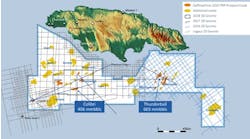Offshore staff
EDINBURGH, UK– Wood Mackenzie has issued its verdict on the four changes that the UK government made to Britain’s upstream fiscal regime in this week’s budget.
These comprise:
- A reduction in the supplementary charge tax (SCT) from 30% to 20%
- Reduction in petroleum revenue tax (PRT) from 50% to 35%
- Introduction of a basin-wide Investment Allowance, allowing exemption of 62.5% of new investment expenditure from SCT
- £20 million ($29.5 million) support for the newly formedOil and Gas Authority to commission seismic and other surveys on under-explored areas of the UK continental shelf (UKCS) during 2015-2016.
Mhairidh Evans, UK upstream senior research analyst, said: “The announcement was largely in line with what we were expecting and will be widely welcomed by industry. The Investment Allowance simplifies and widens the scope of the current Value Allowance system. Cuts in the headline rates will reduce the marginal tax rate for most onstream and all new fields from 60% to 50%.
“For older fields also liable for PRT, this reduction will be 80% to 67.5%. We estimate that 50 of the 328 onstream fields in the UK continental shelf pay PRT. Although this only impacts about 15% of fields, this is the lowest rate of PRT since the 1970s and will increase the share of field profits by 62.5%.”
However, Evans cautioned that there would be disappointment that more has not been done to revive exploration offshore the UK. “The effect of the Investment Allowance is unlikely to extend to opening new plays, and £20 million will be used up quickly on surveys in frontier areas. Further work will still be required to address the long-term challenges of the UK’s high-cost operating environment and dry project pipeline.”
Industry association Oil & Gas UK was broadly supportive of the changes. CEO Malcolm Webb said: “Today’s announcement lays the foundations for the regeneration of theUK North Sea.
“The industry itself must now build on this by delivering the cost and efficiency improvements required to secure its competitiveness…These measures send exactly the right signal to investors. They properly reflect the needs of this maturing oil and gas province and will allow the UK to compete internationally for investment.”
Oil & Gas UK estimated that, in the near-term, the collective changes could incentivize an additional £4 billion ($5.9 billion) of capital investment on the shelf, allowing development to go forward of 500 MMboe which at today’s prices are worth £20 billion ($29.5 billion).
Webb added: “Continued attention must be paid to improving the cost base and production efficiency of the UKCS in order to secure the maximum effect from today’s changes.”
Another association, Subsea UK, also applauded the measures, pointing out thatBritain’s subsea industry generates annual revenues of £9 billion ($13.3 billion) and supports around 55,000 jobs.
Chairman Bill Edgar said: “All the measures combined are welcome, particularly the reduction in petroleum revenue tax. A temporary suspension of the supplementary charge for a period of at least two years is what was really needed to get things moving again in the low oil price era. However the reduction in supplementary charge combined with the investment allowances should stimulate new field developments where subsea engineering will play a vital role.
“Lower PRT should see increased investment in brownfield activity to maximize production and this is good news for the subsea inspection, repair, and maintenance sector which has been feeling the pain in recent months. The seismic program proposals will provide valuable information on areas of untapped potential which will largely be unlocked by subsea technology and expertise.”
John McDonald, managing director of OPITO,Britain’s oil and gas industry skills body, said: “It was critical that action be taken to encourage investment, which will contribute to the retainment of skills held within the industry’s workforce. This will ensure the industry continues to be a positive contributor and source of employment in the years ahead. We are pleased the UK government has listened to the industry’s concerns.
Dan Macdonald, founder of independent business group N-56, which was a vocal supporter of independence of Scotland from the UK ahead of last year’s referendum, was less impressed: “The proposed overhaul of the tax regime as it relates to North Sea oil and gas is a much-needed contribution to boosting this sector. It is a great shame however that the tax increases previously introduced by the Chancellor, and the punitive tax burden it placed on the sector, had such a major impact, exacerbating the issue of global low oil prices and leading to the loss of thousands of jobs.
“It is also disappointing that the Chancellor did not heed our call for government policy and decision makers responsible for oil and gas taxation and regulation to be relocated from London to Aberdeen, moving them closer to the industry itself and echoing the situation in Norway; or for the delivery of a Hydrocarbon Investment Bank, boosting investment in the sector.”
03/20/2015


